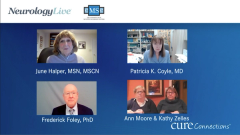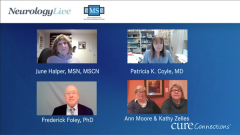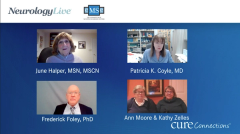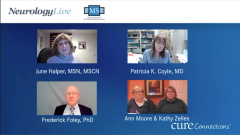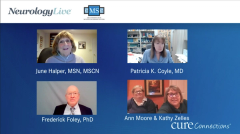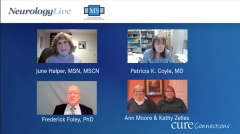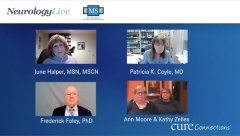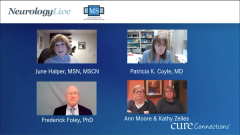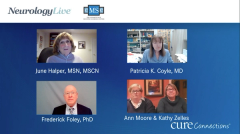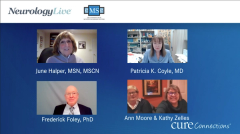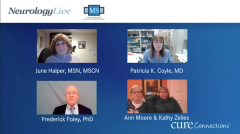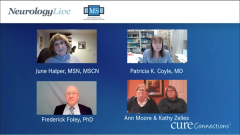
Managing Psychological Symptoms of Multiple Sclerosis

Episodes in this series

Patient and neurologist perspectives on managing the psychological challenges with multiple sclerosis.
June Halper, MSN, MSCN: Ann and Kathy, I know you’ve had your personal journey, and I know one of the reasons we’re all together tonight is that you’ve had a professional relationship with Dr. Foley. How has the type of therapy he spoke about just now helped the two of you manage to get over the, as you mentioned, bumps in the road?
Ann Moore: The cognitive behavioral therapy that Dr. Foley does with me has helped me very much. As a matter of fact, I’m utilizing his services right now. We’re doing it virtually on FaceTime. But I’ve got to tell you, every time that I think I’m starting to tank, or things aren’t going well, or I may be frustrating or scaring Kathy, that’s when I go call Fred Foley. And he has made many suggestions. He’s helped me work with my breathing. He’s made tremendous suggestions in how to help me, because I’m one who can beat myself up better than anybody in this world, and I can be an all or nothing person. Dr. Foley has helped me to try and find the middle of the road, the gray area, and he’s very good at that.
June Halper, MSN, MSCN: Dr. Coyle, I know you have a comprehensive care center. How do you integrate the more psychological aspect of managing MS [multiple sclerosis] into your work?
Patricia K. Coyle, MD: There are three things that I would mention. Number 1 is have a go-to psychiatrist, at least one, possibly two psychiatrists who have an interest in MS who you can refer to or discuss patients with, who have a vested interest in MS. They can be very valuable for teaching for seminars, etc., or for starting patient groups. Secondly, a social worker. There is so much pressure that can be put on an MS individual if they’re having problems with their job, or with their insurance, or with funding, etc. A social worker can be key, who’s knowledgeable, and also knowledgeable about MS. To have identified someone, that is very helpful and we do have someone like that.
Thirdly, our doctoral-level neuropsychologists are a core part of our MS team. We turn to them for cognitive function testing. But a full cognitive function testing also takes into account other symptoms— depression, anxiety. They can make very knowledgeable recommendations about sites and referrals, etc. We find that extraordinarily helpful. At all three of those levels, we have integrated people who have a particular interest in MS to enhance the comprehensive care.
June Halper, MSN, MSCN: Fred, do you agree?
Frederick Foley, PhD: Yes, I do agree. Having neuropsychology is essential for many reasons. Cognitive issues and problems are hard to detect, and if they go undetected, people lose their jobs, it has severe consequences for their lives. We can advise them if they’re having cognitive changes to receive rehabilitation for that, to consult employment attorneys, and to negotiate to get reasonable accommodations at work, and also to educate families and partners that there are these cognitive changes that are very real. The person is not doing this on purpose, the changes are a result of the cognitive changes, and it requires an adjustment on everyone’s part.
June Halper, MSN, MSCN: We’re so lucky that in our area that we have you, and Dr. Coyle, and the team. But I’m just thinking of course, today in the era of COVID-19 [coronavirus disease 2019], and what we’ve been all dealing with and also people who live in areas that are rural with an MS center maybe hundreds of miles away. Again, that’s tough. We’re very lucky, we’re very lucky to have you and your team. I guess one of my dream things would be some day to be able to have a comprehensive care center in every state, so people would have a resource. I’ll say it over and over again, we’re lucky to have you guys. It’s amazing to have worked with you and to see the work with positive results you both have achieved in your models of care.
I want to thank you all for watching and joining us at this NeurologyLive® Cure Connections®. If you enjoyed this program, please subscribe to the e-newsletter to receive upcoming information about other programs. I’d like to thank you all for the time and for this wonderful opportunity, and hope to see you all again.
Newsletter
Keep your finger on the pulse of neurology—subscribe to NeurologyLive for expert interviews, new data, and breakthrough treatment updates.

